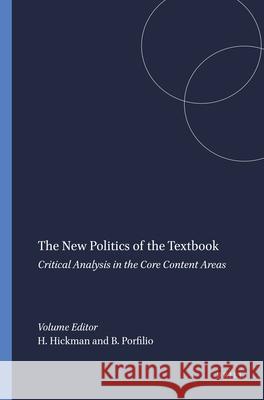The New Politics of the Textbook : Critical Analysis in the Core Content Areas » książka
The New Politics of the Textbook : Critical Analysis in the Core Content Areas
ISBN-13: 9789460919282 / Angielski / Miękka / 2012 / 368 str.
The New Politics of the Textbook : Critical Analysis in the Core Content Areas
ISBN-13: 9789460919282 / Angielski / Miękka / 2012 / 368 str.
(netto: 178,07 VAT: 5%)
Najniższa cena z 30 dni: 179,73
ok. 30 dni roboczych.
Darmowa dostawa!
In an era when corporate and political leaders are using their power to control every aspect of the schooling process in North America, there has been surprisingly little research on the impact of textbook content on students.The contributors of this volume and its partner (The New Politics of the Textbook: Problematizing the Portrayal of Marginalized Groups in Textbooks) guide educators, school administrators, academics, and other concerned citizens to unpack the political, social, and cultural influences inherent in the textbooks of core content areas such as math, science, English, and social science. They urge readers to reconsider the role textbooks play in the creation of students' political, social, and moral development and in perpetuating asymmetrical social and economic relationships, where social actors are bestowed unearned privileges and entitlements based upon their race, gender, sexuality, class, religion and linguistic background. Finally, they suggest ways to resist the hegemony of those texts through critical analyses, critical questioning, and critical pedagogies.
In an era when corporate and political leaders are using their power to control every aspect of the schooling process in North America, there has been surprisingly little research on the impact of textbook content on students.The contributors of this volume and its partner (The New Politics of the Textbook: Problematizing the Portrayal of Marginalized Groups in Textbooks) guide educators, school administrators, academics, and other concerned citizens to unpack the political, social, and cultural influences inherent in the textbooks of core content areas such as math, science, English, and social science. They urge readers to reconsider the role textbooks play in the creation of students political, social, and moral development and in perpetuating asymmetrical social and economic relationships, where social actors are bestowed unearned privileges and entitlements based upon their race, gender, sexuality, class, religion and linguistic background. Finally, they suggest ways to resist the hegemony of those texts through critical analyses, critical questioning, and critical pedagogies.











